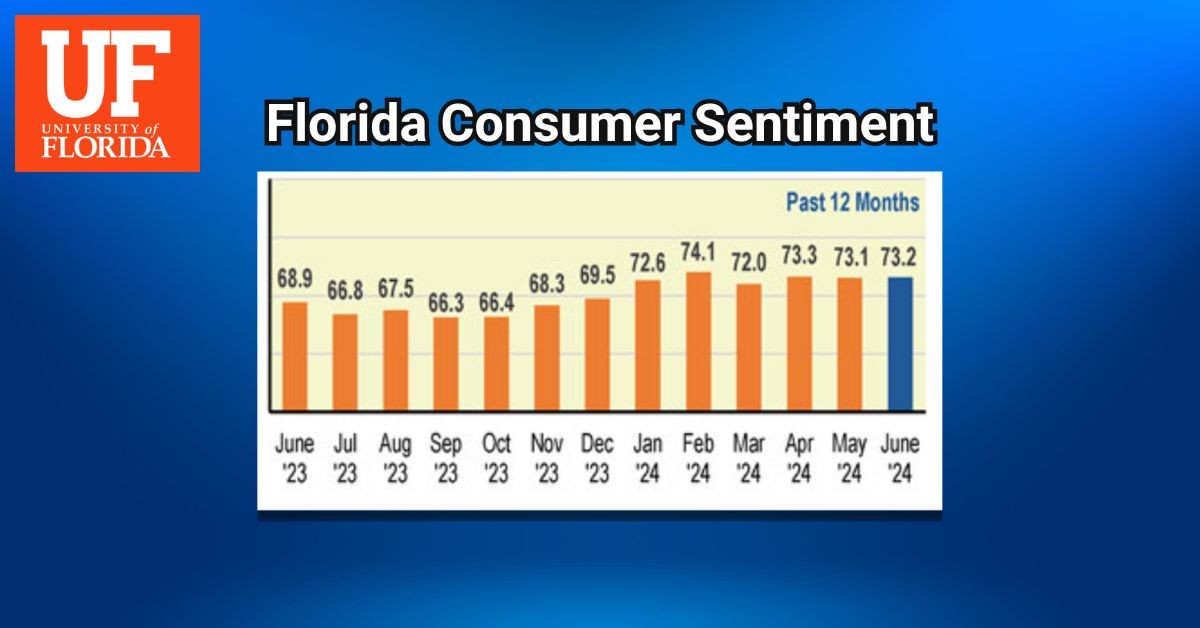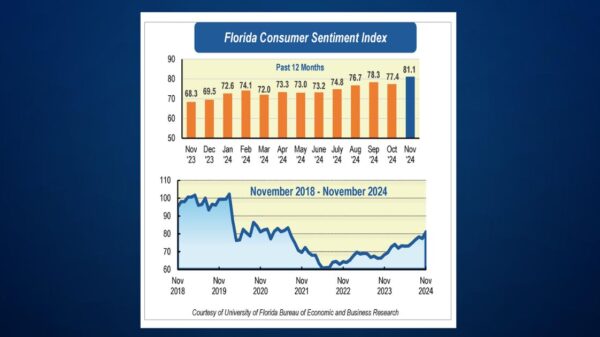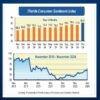By Elizabeth Lynch
Consumer sentiment among Floridians inched up two-tenths of a point in June to 73.2 from a revised figure of 73 in May. In contrast, national consumer sentiment declined for the third consecutive month, dropping nine-tenths of a point.
“During the first half of the year, Florida’s consumer confidence has fluctuated without achieving significant overall gains, thus slowing the upward trend observed in the latter part of last year. Currently, consumer sentiment is 4.3 points higher than a year ago and 12.2 points higher than two years ago, when confidence remained near some of the lowest levels on record. This muted improvement is due to higher-than-expected inflation observed this year and the Fed’s decision to maintain interest rates at historically high levels,” said Hector H. Sandoval, director of the Economic Analysis Program at UF’s Bureau of Economic and Business Research.
Among the five components that make up the index, two increased and three decreased.
Floridians’ opinions about current economic conditions were pessimistic in June. Views of personal financial situations now compared with a year ago decreased one point from 59.8 to 58.8. However, these views were divided across sociodemographic groups with men, people younger than 60, and people with an annual income over $50,000 expressing more favorable views. Opinions as to whether now is a good time to buy a major household item, such as a refrigerator, declined slightly two-tenths of a point from 62 to 61.8. Similarly, opinions were split by demographics, but in this case women and people older than 60 expressed more optimistic views, as well as people with an annual income over $50,000.
The three components corresponding to Floridians’ expectations about future economic conditions were mixed. Expectations of personal financial situations a year from now saw the largest increase this month, rising 2.6 point from 85.3 to 87.9. These expectations varied across demographic groups, with men and people with an annual income under $50,000 holding more pessimistic views. Outlooks of U.S. economic conditions over the next year decreased one point from 76.1 to 75.1, while expectations of U.S. economic conditions over the next five years increased slightly four-tenths of a point from 82 to 82.4. Views on the country’s economic prospects were split by demographics, with people 60 and older and people with an annual income over $50,000 holding more optimistic expectations across both components. Women also expressed optimism regarding long-term expectations.
“It’s noteworthy that people with an annual income under $50,000 consistently expressed more pessimistic views across all five components and were particularly gloomy regarding expectations one year from now. Lower-income individuals face increased financial strain, allocating a larger portion of their income to essentials like housing costs. This strain has worsened due to persistent inflation and higher borrowing costs, contributing to their disconsolate outlook. However, it’s worth noting that inflation in parts of Florida appears to be easing. According to the Bureau of Labor Statistics, annual inflation in the Tampa area reached 1.8% in May, below the Fed’s 2% target. If this trend continues statewide, Floridians may experience some relief in the months ahead,” said Sandoval.
“Looking ahead, as the U.S. presidential campaigns intensify, fluctuations in consumer sentiment are common, influenced by economic forecasts and speculation about each candidate’s potential policies. However, as long as the Fed maintains its current stance on interest rates, we do not expect significant changes in consumer confidence in the months ahead,” said Sandoval.
Conducted May 1 to June 27, the UF study reflects the responses of 263 individuals who were reached on cellphones and 288 individuals reached through an online panel, a total of 551 individuals, representing a demographic cross section of Florida. The index used by UF researchers is benchmarked to 1966, which means a value of 100 represents the same level of confidence for that year. The lowest index possible is a 2, the highest is 150.
Details of this month’s survey can be found at https://www.bebr.ufl.edu/florida-consumer-sentiment/


















